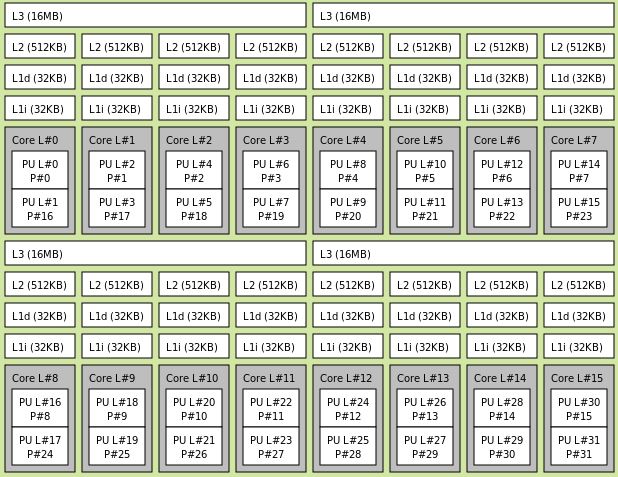Table of Contents
- Game stutters when using ZFS on UnRAID
- My zpool is busy but I cant tell why
- Unable to modify filesets status
In addition to all the 'normal' things you should go through in order to ensure a low latency gaming experience on UnRAID, you need to take some additional steps to attempt to further restrict the opportunities for the kernel to use the CPU's you're attempting to isolate for VM usage. Unfortunately ZFS doesn't properly respect the isolcpus value alone, so some further steps are necessary.
For reference, I've copied my syslinux.cfg configuration below, where my intention is to isolate the last 4 cores of a 16 core CPU:
label Unraid OS
menu default
kernel /bzimage
append initrd=/bzroot nomodeset mitigations=off amd_iommu=on isolcpus=12-15,28-31 nohz_full=12-15,28-31 rcu_nocbs=12-15,28-31This was all that was needed for my threadripper 3955wx; looking at the CPU topology, I'm restricting all cores of a single CCX:
You can see a really great video on how this topology image is generated in SpaceInvader's video, but if you don't have a multi-cpu or multi-chiplet CPU (which you could tell by generating the topology image as in the video), then you may need to take take some additional steps.
There's a tool for this now, created by the same person who created sanoid/syncoid (Jim Salter), called ioztat (think 'iostat for zfs'). It's not available through the nerd/dev packs (it's a relatively recent-sh creation), and may well continue to be updated anyway, so we'll install directly from git.
You'll likely want to a fileset which we can use to store the tool - for myself, I have all little git tools in one fileset, so did something like this:
zfs create wd/utility/git -o compression=zstd-3 -o xattr=sa -o recordsize=32K
# now we're going to pull down the code into our fileset
cd /mnt/wd/utility/git
git clone https://github.com/jimsalterjrs/ioztat
# you should see it listed there now
ls -lhaFr
drwx------ 3 root root 8 Mar 14 11:29 ioztat/
# don't forget to make it executable
chmod +x ioztat/ioztatNow, you can just execute the command, but only currently from the directory it's saved in. I've a bunch of random tools installed, and there's no way I'd remember all of these. One of the bigger annoyances I've had with unraid is how complicated it is to customize in a way that survives a reboot (recompile the kernel to install a tool a few KB in size? Ugh). We could just link them to our go file or something, but if you're like me, your go file is messy enough as it is...
What I've done instead is to create files (placing them all inside of a folder called 'scripts', which I also put in the 'utility' fileset) that contain all my cli/shell 'customizations', then have unraid's User Scripts run through them at first array start. While they don't * Technically * persist across reboots, this method sufficiently works around it (annoying, but solvable):
# create the files
nano /mnt/wd/utility/scripts/createSymlinks.sh
# create your symlinks - here's a small subset of mine -
# # Shell profiles
ln -sf /mnt/wd/utility/git/.tmux/.tmux.conf /root/.tmux.conf
cp /mnt/wd/utility/git/.tmux/.tmux.conf.local /root/.tmux.conf.local
ln -sf /mnt/wd/utility/bvd-home/.bash_profile /root/.bash_profile
# # Bad ideas
ln -sf /mnt/wd/dock/free-ipa /var/lib/ipa-data
# # CLI tools and Apps
ln -sf /mnt/wd/utility/git/ioztat/ioztat /usr/bin/ioztat
ln -sf /mnt/wd/utility/git/btop/btop /usr/bin/btopI actually have multiple files here, each one being 'grouped' - if it's just linking a tool so it's available from the shell, that's one file, another is for linking a few privileged containers I've got running to where they 'should' be where they installed on bare metal, things like that. This way, if I screw something up and dont find out till I reboot some months later, it'll make figuring out which thing I screwed up (and where) far easier.
This happens when something is using either the dataset itself (at the filesystem level), or some of the contents within it. Common causes include:
- Application using fileset contents
- Network access (mounted via SMB/NFS/iSCSI)
- If attempting deletion:
- The filesystem is currently
mountedby your host (unraid) - Snapshots currently exist for the fileset
- The filesystem is currently
For unmount issues, you can bypass the userspace restrictions by going directly to ZFS and issuing a rename; it's important to note that this could impact any applications using it, only recommended when you're either certain there's no active access, or if you plan on deleting the fileset anyway after unmounting
zfs rename tank/filesetName tank/newFilesetName
zfs destroy tank/newFilesetName
# be cognizant of potential impact on nested filesets and their mountpoints, such as tank/datasetName/datsetChileName-
This usually due to a process (PID) using that fileset or some part of it's contents. You can verify whether the below example, where I have my pool
wdmounted tomntand am trying to figure out what's using mynginxcontainer:root@milkyway:~# ps -auxe | grep /mnt/wd/dock/nginx root 63910 0.0 0.0 3912 2004 pts/0 S+ 12:19 0:00 grep /mnt/wd/dock/nginx <croppedForBrevity>
-
You then simply kill that PID:
kill -9 63910
If a new PID is spawned almost right after you've killed one for the same process, you've likely got some kind of automation running -
- Autosnapshot tools - sanoid/syncoid/auto-snapshot.sh, anything that automatically handles snapshot management and is currently configured on the system can cause this. If you have it, kill that process (e.g. sanoid) first, then retry.
- As an alternative, edit the config (such as your
sanoid.conf) so it's no longer set to snapshot that fileset, restart the tool (sanoid here), and try again
- As an alternative, edit the config (such as your
- intermittent commands - you can try
umount -l /mnt/pathto do alazyunmount; pretty commonly needed for a variety of reasons.
